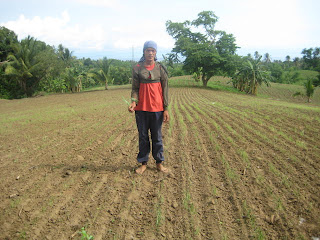Calaca, Batangas – Army worms have feasted on palay, corn and sugarcane plantations here, destroying around 1,266 hectares of farmland in the town since July 2, the municipal agriculturist office said.
Quoting field reports, Calaca municipal agriculturist Alicia Cabrera said that the village of Niyugan was the heaviest plagued area, with the worms attacking a total farm area of 130.5 hectares, followed by Bisaya (129 has.) and Makina (103.95 has.) villages.
In an interview with SLI, Cabrera said that the worm infestation was first reported on July 2 in the villages of Makina and Dila, but the ravage eventually spread out to 28 of the town’s 34 villages.
“These army worms came from a moth’s caterpillar stage. Because of the heavy drought, these butterflies have laid their eggs. Now that the rainy season has begun, they rose from the ground and attacked the crops,” Cabrera said in Filipino.
An army worm is the catterpillar life stage of a moth. It is regarded as a pest and can wreak havoc with crops if left to multiply.
According to the Regional Crop Protection of the Philippines, an army worm’s most damaging stage is the larva stage, as it can either feed upon leaf tips or along leaf margins or feed upon leaves leaving only the midribs.
An army worm can also damage crops by removing the whole leaves and plants for severe infestation; cut on stem and plant base and cut rice panicles from base.
Cabrera however clarified that the worm infestation will not cause the affected crops to die but will only impede their growth.
She explained that most of the affected palay crops were still on their tillering stage while the corn crops were on their vegetative stage and the leaves will eventually grow and be replaced as soon as they were eaten by the worms.
“(Food) production is really affected since those farms attacked by army worms will definitely not be able to provide the needed production by harvest time,” Cabrera said.
To prevent further damage on the crops, she said that the Calaca municipal government has already bought P50,000 worth of insecticides to be distributed to the farmers.
“Because of the (town’s) vast rice and sugarcane farms, we have not yet controlled all of them. But we have already controlled those areas with army worms by recommending a poison that would kill the outbreak that destroyed our crops,” Cabrera said.
Forty-year-old farmer Glenda Cabungcal, who works in a rice and sugarcane field in the village of Sinisian, said that the worms have severely damaged their crops and it would take them a long time to recover their investment.
“We have been farmers for a long time but this was the only time for the last 45 years that this thing happened. We’ve invested P15,000 and we’re not even sure whether or not we will be able to earn profits again,” Cabungcal said.
She said they have already sprayed insecticides on the affected farms, which had killed the pests but they are still waiting for a heavy downpour so that their crops would grow.
The Provincial Agriculture Office (PAO) has not yet released a figure on the total number of hectares affected by army worms and the estimated amount of damages on crops.
It confirmed, however, that the pest had already damaged vast farmlands in the first district particularly in the towns of Lemery, Taal, Calaca, Nasugbu, Balayan, Lian, Calatagan and Tuy.
PAO Agriculturist II Seferino Arago said though that the damage to crops may not be too severe as studies show that they have 80 to 90 percent chance to recover from the worm infestation.
“According to the technical people, as soon as the climate changes and it starts to rain, then the worms will die and the chances of recovery are high,” he said in a separate interview. (By Marlon Alexander Luistro)



No comments:
Post a Comment